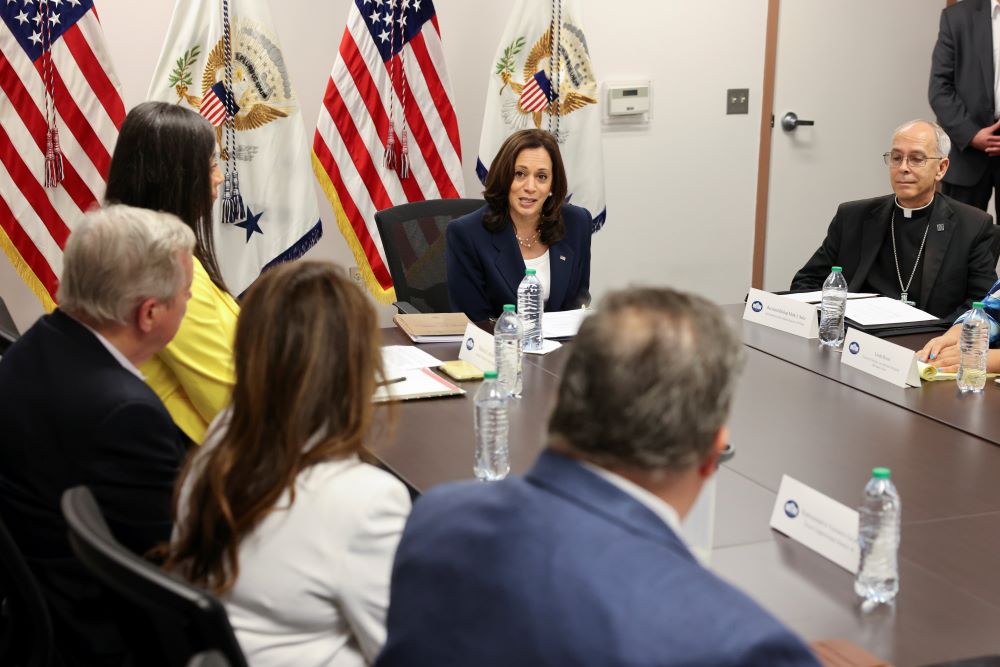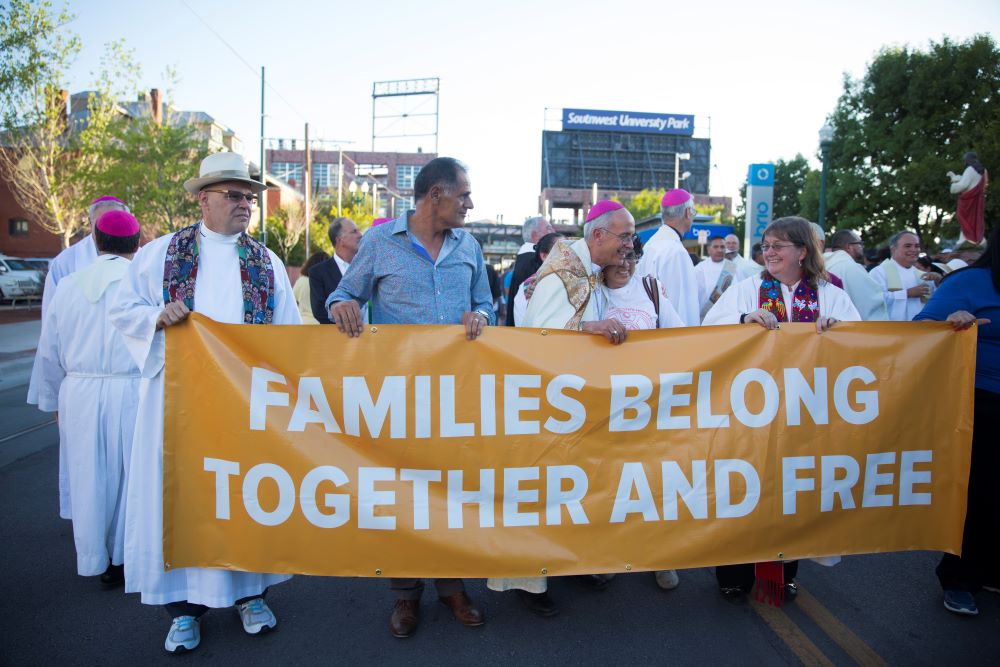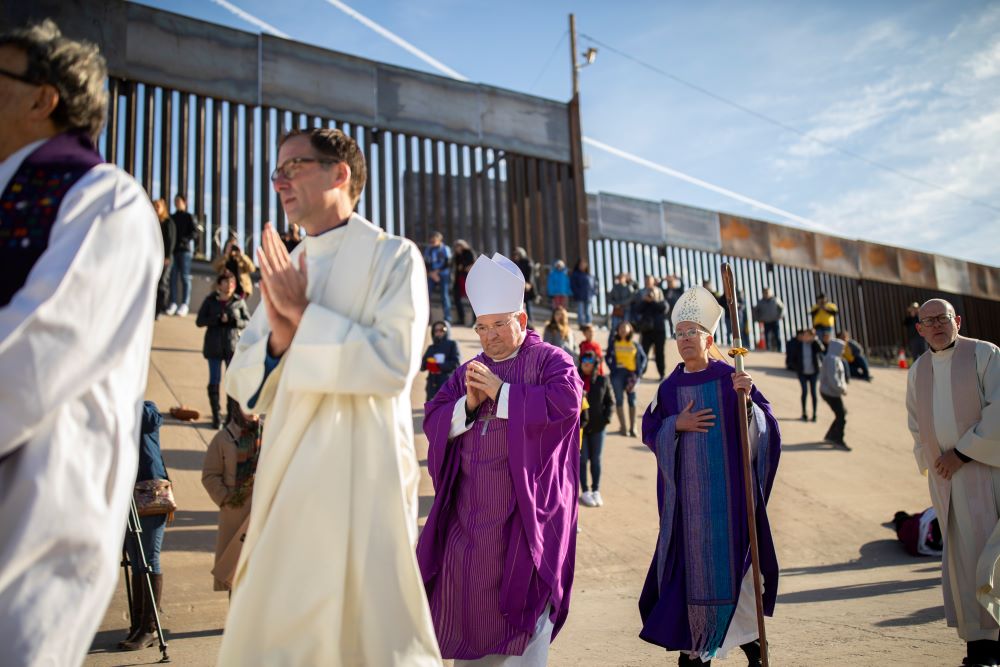Bishop Mark Seitz of El Paso, Texas, shares a smile with a Honduran girl named Cesia as he walks and prays with a group of migrants at the Lerdo International Bridge in El Paso June 27, 2019. (OSV News/Reuters/Jose Luis Gonzalez)
A few months ago, El Paso Bishop Mark Seitz was called to the hospital bedside of a 19-year-old migrant who had collapsed with heat stroke in the desert.
"Even though he was on all these machines and respirators, you could see it was a vital, healthy man before this happened," Seitz told NCR. "And now all his organs were shutting down, and they couldn't do a thing to stop it."
Seitz offered final prayers for the young man among tearful nurses who had exhausted treatment options, before he was taken off life support.
After record-breaking migrant deaths last year near El Paso, praying for dying migrants from Central and South America has become a regular part of Seitz's pastoral work.
In several cases, the bishop has been able to find phone numbers to call parents or family members after offering Last Rites, or saying final prayers. "I knew how much it would mean to them to hear that, at least in their last hours, there were people who loved them, who were caring for them. And that they didn't die alone," Seitz said.

El Paso, Texas, Bishop Mark Seitz of El Paso, right, takes part in a roundtable discussion with U.S. Vice President Kamala Harris at Paso del Norte Port of Entry in El Paso on June 25, 2021. Participants included faith and community leaders who were helping migrants seeking asylum. (CNS/Reuters/Evelyn Hockstein)
In the El Paso Sector, the U.S. Customs and Border Protection area including a swatch of Texas and all of New Mexico, 148 migrants died between Oct. 1, 2022, and Sept. 30, 2023. That number is more than double the 71 deaths in the same period of fiscal year 2022, according to the border patrol. In previous years, no more than 40 migrant deaths had been recorded.
More than 100 of those deaths occurred between May and September, during the hottest summer on record in El Paso with temperatures over 100 degrees for 44 days straight. Globally, summer 2023 was the hottest on record, part of a warming trend scientists attribute to greenhouse gas emissions caused by humans burning fossil fuels.
As climate change is making migration more deadly, it is also driving people from their homes in places like Central America.
Seitz, who chairs the U.S. bishops' conference's committee on migration, spoke with NCR in Baltimore on Nov. 14, on the sidelines of the U.S. bishops' annual fall assembly. He attributed the increase in migrant deaths to the deadly heat and "the increasingly militarized policies and restrictions for people to cross," which he said "have caused people to seek even more dangerous ways of getting into the country."

Bishop Mark Seitz of El Paso, Texas, embraces a woman during a march for immigration rights July 20, 2018, in El Paso. Participants were advocating for unification of families separated at the U.S.-Mexico border. (CNS/Jorge Salgado)
The bishop criticized the lack of legal options for migrants to enter the country, including problems with the CBP One phone app, which migrants must now use to make asylum appointments.
"You can't just stand above it and say, 'well, the government has offered all these means.' Clearly it's not enough or people wouldn't risk their life," Seitz said.
Seitz said that his pastoral ministry to migrants keeps his passion alive for advocacy work related to immigration policy.
"So much of the problem here in this country is that we have, in a certain way, objectified this reality of immigration," Seitz said. "We've made it simply a matter of numbers and ideas rather than dealing with human beings who we believe as Christians are our brothers and sisters," he said.
Seitz, appointed El Paso bishop in 2013, is the first border bishop to lead the U.S. bishops' conference work on migration in several decades. Born in Milwaukee, Wisconsin, he doesn't have his own migration experience, but he expressed a closeness with the migrants he works with.
"The service of the Gospel," he said, "helps you to feel one with the people you serve." Seitz continued, "You don't do it from a thousand-foot level; you do it from a set of relationships that become your family." He feels a certain "belonging" to the migrants he works with, he said.
Seitz said that as a non-immigrant, he takes the opportunity to connect immigrants with powerful decision-makers and to use his own experiences to "challenge" those who are not from the immigrant community.
The scale of Seitz' advocacy work on migration is expansive, addressing both U.S. policy and root causes of migration. In the last month, he provided Congress with a set of recommendations to improve the protection of unaccompanied migrant children and met with State Department and other U.S. officials about threats to democracy in Guatemala that Guatemalans have linked to growing poverty.

Mark Seitz of El Paso, Texas, second from right, and Bishop Peter Baldacchino of Las Cruces, N.M., arrive to concelebrate Mass Nov. 2, 2019, in El Paso on the U.S.-Mexico border with the three border dioceses of El Paso, Las Cruces, N.M., and Ciudad Juarez, Mexico. (CNS/Ivan Pierre Aguirre)
To get involved in advocacy, Seitz said, Catholics should "stay in touch" with the Gospel and "find a way to meet an immigrant."
He acknowledged that some people fear that they will lose something when their community expands to include immigrants. Instead, he said, "Your faith will be tremendously enriched by your experience, and you'll find people who live their faith deeply, and who celebrate their faith beautifully, and who will build something that really looks much more like the kingdom of God."
Seitz encouraged Catholics who have already developed those relationships and Catholics within immigrant communities to contact their elected representatives. "We're not going to change the immigration system in significant ways until our legislators are hearing from the people in their districts that this is something that is of value to them," he said.
Advertisement
When speaking to migrants who are facing the challenges of U.S. immigration policies, Seitz said that he apologizes that "we're not living up to the fundamental principles upon which this country was built."
But he also assures migrants, "We will not give up. We're going to continue to, as a church, to seek to be faithful to what Jesus has taught us, and to care for them, respect their human dignity, which is not something conferred by one's citizenship, but rather by the one who created us."
Seitz said the immigrants he works with, not him, bring hope and faith. "It's the immigrants themselves who are people who teach me how much we need to really trust God and trust his goodness to work among those for whom he has a special love," he said.
The bishop also said that he hangs on to "my trust that this issue doesn't depend on me, or any one individual. It depends on Jesus Christ, ultimately, who gives me reason for hope, even when I'm dealing with a situation that is so frustrating and difficult."








